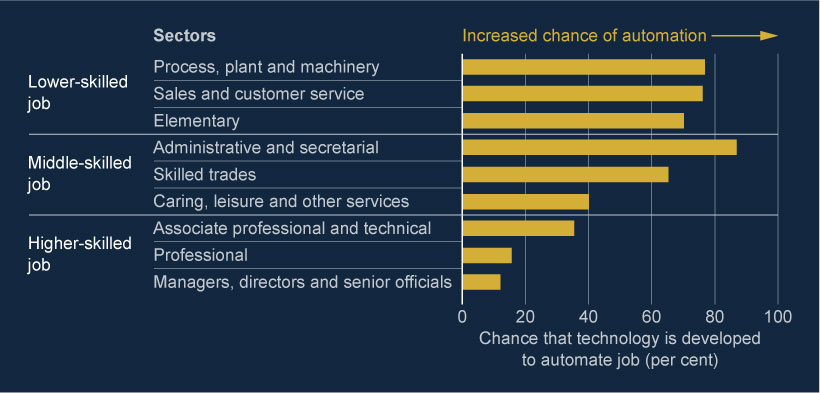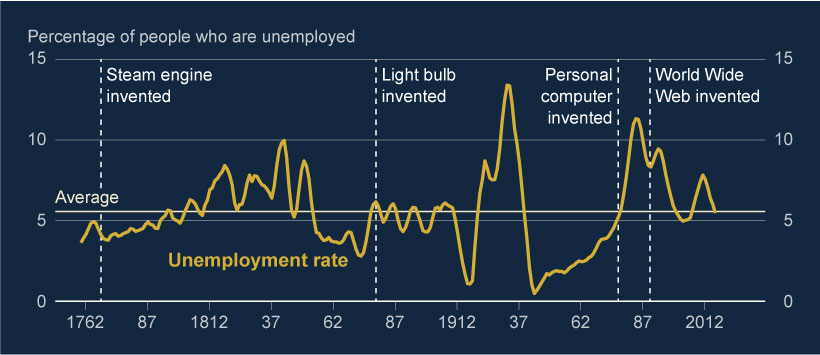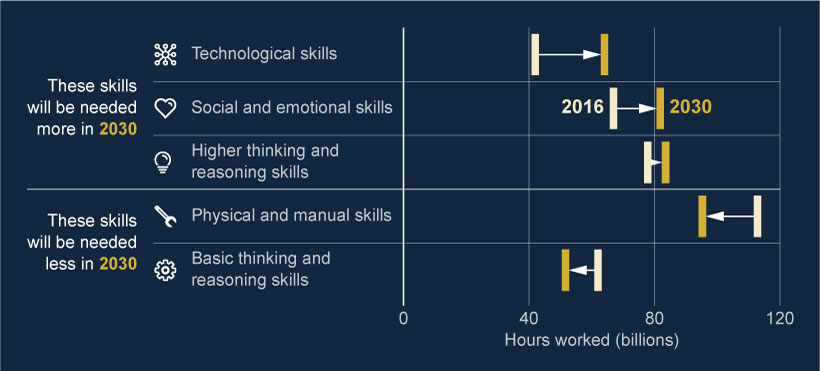Technology has impacted jobs throughout history. Inventions such as electricity and computers have completely changed the way we work.
And it’s no different today. Self-driving cars, robotics, advances in artificial intelligence (AI) and automation continue to affect people’s jobs.
Will it impact my job?
Changes in technology will affect everyone differently. It could affect your work by improving your productivity, creating new job opportunities, or in some cases, replacing your job.
Productivity
Better technology could improve your work and allow you to do or produce more. If there’s an increase in the amount of work you do, then your pay could go up.
For example, smartphones have changed the way we communicate. You no longer need to be at your desk to talk to your colleagues. You can send documents on the go and reply speedily. It saves time, meaning you can do more.
Opportunity
New technology creates new jobs. For example, in the early 1900’s jobs such as IT specialists, software developers and professional eGamers would have been unimaginable. New jobs create more opportunities for people to try something new or develop their skills.
Replacement
Growth in AI means that more jobs will be done by machines and some are more likely to be automated than others.
Throughout history jobs have been destroyed because of new innovations. For example, a ‘knocker-up’ used to be a profession in the UK – their job was to wake up workers. But this became extinct after the wind-up alarm clock was invented.
More recently, factory workers have been replaced by machines, supermarket cashiers replaced by self-checkout machines and delivery drivers replaced by robots.
Which jobs are more likely to be automated?


For example, if you look at taxi driving it has a high chance of being automated as we see more driverless cars. However, jobs such as nursing and teaching have a low chance of being automated because of the need for human interaction, emotional intelligence and empathetic thinking.
What can we learn from the past?
Despite several technological revolutions and many jobs becoming extinct, average unemployment rates today are similar to those in the 18th century.

With any process of economic change there are always winners and losers. Who these are depends on the types of change. In the 19th century highly skilled trades people lost out as machines allowed their jobs to be performed more cheaply by lower-skilled workers. In the 20th century technological change has helped the most skilled. For those who do lose their jobs, it is likely that the process of reskilling and finding new work is slow and costly.
But history tells us that new technology can benefit almost everyone. In the past, it has helped to make our economy more productive. That meant employers could pay higher wages.
One questions for us now, as a country, is how to help people who are likely to lose out because of new technology. Another is, how can we make sure the next generation can make the most of it.
What does the future hold?
We can already see examples of machines replacing physical aspects of people’s jobs, such as machines assembling a car on a factory production line.
Rapid improvements in computing power and advances in AI mean smarter machines are already replacing a broader range of human activities than ever before.
If robots are able to reason more efficiently than a human then a new wave of jobs could be replaced. Some of these include telephone salespeople and taxi drivers.
But certain jobs which have a greater need for people and social skills, such as empathy, are unlikely to be replaced. If you’re a nurse, teacher, social worker or therapist it’s unlikely a machine could replace the skills needed for your work.
However, when people estimate which jobs are most at risk of automation, they often overlook some important factors.
For example, it might be possible to automate pouring drinks in a bar but that doesn’t mean it will be cheaper than hiring bar staff. This shows that companies have other things to consider, such as cost, before implementing new technologies.
As we’ve seen in the past, technology might change the nature of jobs but it doesn’t necessarily remove the need for them completely. Think about the role of a secretary – 50 years ago this job was completely different than it is today, but the job still exists. However if change happens this way, the need to develop your skills remains essential.

